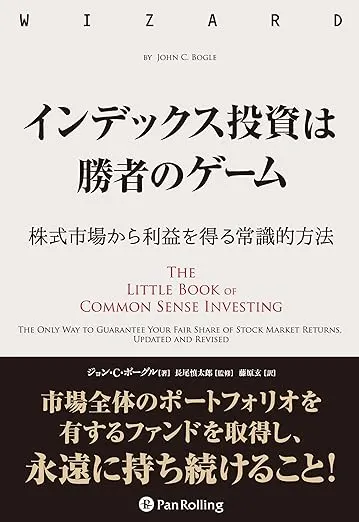
The Little Book of Common Sense Investing Review
I read this book because it was free on Prime Reading.

Overall rating: +1 (Recommended!)
There are several books that recommend index investing, but I think this is one of the best among them.
The argument is simple and fundamental, and the structure of the book is concise and easy to read.
It's especially recommended for those who want to start long-term investing but don't know what to do.
Overview
This is a Japanese translation of a book written by John C. Bogle, the founder of Vanguard, in 2007.

Some might already know what kind of arguments to expect given it's Vanguard... and it's exactly as you'd imagine.
By the way, the "winner" in the title refers to those who can achieve investment results very close to the market average.
This is not a book that aims to increase your assets tenfold in a month.
The book's argument
The book's argument is very simple and can be summed up in three words:
"Long-term" "Diversification" "Low-cost"
- Investment targets should be held for the long term, and repeating short-term buying and selling will always lose to fees
- Diversification brings you closer to the market average (≒ optimal performance)
- Costs never betray you (in a good way)
In other words, you should not use active funds (which aim for returns exceeding the index by frequent trading or narrowing investment targets), but should use index-linked funds with extremely low fees and leave them alone.
Good points
As expected from the founder of Vanguard, a leading company in low-cost index funds, the argument is clear.
Reading this book will help you understand the benefits and what kind of products you should buy.
It will be particularly beneficial for those who haven't yet established a long-term investment style.
What's characteristic about this book compared to similar ones is that it repeatedly makes simple arguments and introduces actual products (≒ promotion for Vanguard). This makes the book easy to read.
Also, there are occasional words of wisdom. For example, meaningful words like this:
Instead of aiming for big profits... we should be satisfied with the few percent return that can be obtained from the market average
It also includes practical content on portfolio creation, such as changing the allocation with bonds to suit your investment style.
Not-so-good points
While it's generally easy to understand, there were some parts I found questionable.
I might not have fully understood, but I'll summarize them here.
First, it concludes that active funds can't win based on the premise of mean reversion, but I question whether it's correct to assume this because we don't know if it will revert within our lifetime.
Also, if there are clear edges in the market and limited funds that can utilize them, there might be a possibility of outperforming the index over the long term (everyone would lose if everyone used that fund, but realistically that won't happen).
I think this is for the same reason that securities companies employ traders.
However, for the average person, index funds for long-term investment remain the optimal solution...
Next, there are contradictory statements saying "history after management proves that ○○ is superior" and "the recent profits shown by ○○ are just historical data and can't be relied upon".
I think it would have been easier to read without confusion if it had just stated "Let's follow the principle of reducing costs".
And even if you agree with the argument, you need to be careful about the following points when putting it into practice:
- Are there more advantageous products other than Vanguard?
- Which index to choose - global or US stocks? SPDR or MSCI? Excluding Japan?
- Have you factored in the cost of buying US products from Japan?
Thoughts on diversification
In the book, the author writes that "diversifying into US stocks alone is sufficient".
This seems to contradict the initial argument that more diversification is better, but according to the author, in addition to the unnecessary waste of changing from US dollars, he states the following reasons (roughly summarized):
Large US companies are global and draw wealth from various countries. Therefore, diversifying into US stocks is the same as diversifying into various countries around the world
Hmm, that's powerful. Given the strength of the key currency, it's understandable that Americans think diversifying within their own country is sufficient. In fact, VT doesn't seem to sell very well in America.
It might be difficult to recommend unconditionally because it also incurs some cost (0.1%).
However, if you're recommending diversification from the standpoint that anything can happen, it seems logical to recommend VT.
Summary
While there are slight disadvantages in promoting their own products and assuming a US perspective, this is a good book that clearly explains the principles and fundamentals to learn for long-term investment.
When putting it into practice, let's compare with similar products that can be bought domestically and look for good investment trusts and ETFs.
By the way, there are rumors about whether Vanguard's Japanese branch will be established or not. It would be nice if we could buy them cheaply.


